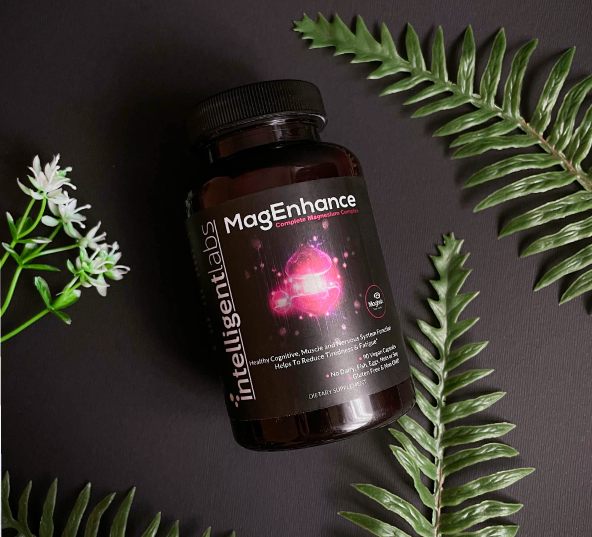Struggling to get a restful night’s sleep? Sleep deprivation can throw off your metabolism, potentially leading to weight gain and other health concerns. The good news is that magnesium may be the key to improving your sleep and helping you wake up feeling refreshed. In this post, we’ll explore how magnesium for sleep works and which form might be best for you.
Table of Contents
Magnesium for Sleep: How Does It Work?
Since poor sleep can throw off your metabolism and hormones, finding a solution is key. Lack of sleep can lead to increased ghrelin levels (the hunger hormone), making you crave more food. It can also contribute to insulin resistance, which leads to weight gain over time.1 2
Magnesium is vital for the proper functioning of GABA receptors in the brain and the central nervous system. GABA is the neurotransmitter that helps you relax, acting as your body’s “chill pill.” By activating these receptors, magnesium helps to turn off your racing mind, making it easier to wind down and fall asleep.3
Magnesium also reduces the effects of glutamine, a neurotransmitter that keeps you awake.3 In addition, magnesium lowers the levels of cortisol and adrenaline, the stress hormones that can keep you tossing and turning at night.4
Research backs up these claims, too. A study published in the Journal of Research in Medical Sciences showed that elderly participants who took 500 mg of magnesium daily experienced significantly better sleep quality and duration compared to a placebo group. This was due to a reduction in cortisol levels and an increase in melatonin, the hormone that regulates sleep cycles.5
The authors concluded that magnesium could be a great treatment for insomnia, not just for the elderly, but for everyone. Considering how affordable and safe magnesium is, it’s definitely worth trying if you’re struggling with sleep. Give it a shot and see how it works for you!
So, Which Magnesium Is Best for Sleep and Insomnia?
Magnesium needs to be combined with another molecule to make it stable. This is why you’ll find magnesium in various forms, like magnesium glycinate, threonate, or taurate. The molecule it’s paired with actually affects how well it works, so choosing the right type is key to getting the full benefits.

At Intelligent Labs, we’ve created MagEnhance, the most effective magnesium for sleep. We have three different types of magnesium in our supplement, specifically chosen for their unique properties.
First up is Magnesium-L-Threonate. This advanced magnesium was developed by MIT scientists to cross the blood-brain barrier, a protective shield between the blood and the brain. Unlike most magnesium supplements, Magnesium-L-Threonate can significantly raise magnesium levels in the brain, which directly helps activate GABA receptors and promotes melatonin production, making it easier for you to fall and stay asleep.6
Next, we include Magnesium Taurate. This form of magnesium works in harmony with GABA receptors to enhance relaxation and support better sleep. It’s especially helpful for calming both the mind and body.7
Finally, there’s Magnesium Glycinate, the most absorbable form of magnesium for your muscles and bones, where most of the magnesium in your body is stored. This form is perfect for addressing magnesium deficiencies in these areas, ensuring your whole body gets the support it needs to stay healthy and relaxed.8
Made in an NSF GMP-certified facility in the USA and third-party tested for purity and potency, you can be confident that every dose of MagEnhance meets the highest quality standards!
How Long Does It Take for Magnesium to Work for Sleep?
When it comes to improving sleep, there are plenty of solutions out there. But magnesium supplements like MagEnhance can make a noticeable difference in as little as 24 hours. It’s essential for activating the systems that help your body relax and fall asleep. The catch? A significant part of the population isn’t getting enough magnesium from their diets.9
Why is that? Well, magnesium is increasingly scarce in the foods we eat. Modern farming methods mean our fruits and veggies grow faster, but they have less time to absorb magnesium from the soil. Plus, stress itself drains magnesium from the body, making it no surprise that so many of us are deficient.
Conclusion
Getting a good night’s sleep is essential for your overall health, and magnesium plays a key role in making that happen. Whether it’s helping regulate sleep-related hormones or relaxing your muscles and mind, magnesium can restore balance to your body and improve your sleep quality.
If you’re struggling to get the sleep you deserve, consider taking MagEnhance Magnesium Complex. Our supplement combines three different types of magnesium – L-Threonate, Taurate, and Glycinate – each chosen for its unique properties to support better sleep. Try it and see how magnesium can help you sleep deeper and wake up refreshed.
💬 We’d love to hear your thoughts! Leave a comment below and share your experience with magnesium or sleep issues.
📩 And while you’re here, join our newsletter for more smart stuff (and secret perks)!
References:
- Broussard, Josiane L., et al. “Elevated Ghrelin Predicts Food Intake during Experimental Sleep Restriction.” Obesity, vol. 24, no. 1, 15 Oct. 2015, pp. 132–138, https://doi.org/10.1002/oby.21321. ↩︎
- Singh, Trisha, et al. “Does Insufficient Sleep Increase the Risk of Developing Insulin Resistance: A Systematic Review.” Cureus, vol. 14, no. 3, 26 Mar. 2022, https://doi.org/10.7759/cureus.23501. ↩︎
- Papadopol, Victoria, and Mihai Nechifor. “Magnesium in Neuroses and Neuroticism.” PubMed, University of Adelaide Press, 2011, www.ncbi.nlm.nih.gov/books/NBK507254/. ↩︎
- Cuciureanu, Magdalena D, and Robert Vink. “Magnesium and Stress.” Nih.gov, University of Adelaide Press, 2011, www.ncbi.nlm.nih.gov/books/NBK507250/. ↩︎
- Abbasi, Behnood, et al. “The Effect of Magnesium Supplementation on Primary Insomnia in Elderly: A Double-Blind Placebo-Controlled Clinical Trial.” Journal of Research in Medical Sciences : The Official Journal of Isfahan University of Medical Sciences, vol. 17, no. 12, Dec. 2012, p. 1161, pmc.ncbi.nlm.nih.gov/articles/PMC3703169/. ↩︎
- Zhang, Chengxiang, et al. “A Magtein®, Magnesium L-Threonate, -Based Formula Improves Brain Cognitive Functions in Healthy Chinese Adults.” Nutrients, vol. 14, no. 24, 8 Dec. 2022, p. 5235, https://doi.org/10.3390/nu14245235. ↩︎
- Ochoa-de la Paz, Lenin, et al. “Taurine and GABA Neurotransmitter Receptors, a Relationship with Therapeutic Potential?” Expert Review of Neurotherapeutics, vol. 19, no. 4, 20 Mar. 2019, pp. 289–291, https://doi.org/10.1080/14737175.2019.1593827. ↩︎
- DiSilvestro, Robert A, et al. “Magnesium Glycinate Supplementation in Bariatric Surgery Patients and Physically Fit Young Adults.” The FASEB Journal, vol. 27, no. S1, Apr. 2013, https://doi.org/10.1096/fasebj.27.1_supplement.lb291. ↩︎
- DiNicolantonio, James J, et al. “Subclinical Magnesium Deficiency: A Principal Driver of Cardiovascular Disease and a Public Health Crisis.” Open Heart, vol. 5, no. 1, 2018, p. e000668, https://doi.org/10.1136/openhrt-2017-000668. ↩︎





